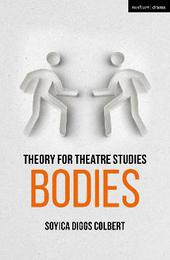
|
Theory for Theatre Studies: Bodies
Paperback / softback
Main Details
| Title |
Theory for Theatre Studies: Bodies
|
| Authors and Contributors |
By (author) Soyica Diggs Colbert
|
|
Series edited by Kim Solga
|
|
Series edited by Susan Bennett
|
| Series | Theory for Theatre Studies |
|---|
| Physical Properties |
| Format:Paperback / softback | | Pages:176 | | Dimensions(mm): Height 198,Width 129 |
|
| Category/Genre | Performance art
Drama
Literary theory |
|---|
| ISBN/Barcode |
9781474246316
|
| Classifications | Dewey:306.4848 |
|---|
| Audience | | Tertiary Education (US: College) | |
|---|
|
Publishing Details |
| Publisher |
Bloomsbury Publishing PLC
|
| Imprint |
Methuen Drama
|
| NZ Release Date |
2 December 2021 |
| Publication Country |
United Kingdom
|
Description
How does theatre shape the body and perceptions of it? How do bodies on stage challenge audience assumptions about material evidence and the truth? Theory for Theatre Studies: Bodies responds to these questions by examining how theatre participates in and informs theories of the body in performance, race, queer, disability, trans, gender, and new media studies. Throughout the 20th century, theories of the body have shifted from understanding the body as irrefutable material evidence of race, sex, and gender, to a social construction constituted in language. In the same period, theatre has struggled with representing ideas through live bodies while calling into question assumptions about the body. This volume demonstrates how theatre contributes to understanding the historical, contemporary and burgeoning theories of the body. It explores how theories of the body inform debates about labor conditions and spatial configurations. Theatre allows performers to shift an audience's understandings of the shape of the bodies on stage, possibly producing a reflexive dynamic for consideration of bodies offstage as well. In addition, casting choices in the theatre, most recently and popularly in Hamilton, question how certain bodies are "cast" in social, historical, and philosophical roles. Through an analysis of contemporary case studies, including The Balcony, Angels in America, and Father Comes Home from the Wars, this volume examines how the theatre theorizes bodies. Online resources are also available to accompany this book.
Author Biography
Soyica Colbert is a Professor of African American Studies and Theater and Performance Studies at Georgetown University. She is the author of The African American Theatrical Body: Reception, Performance and the Stage and Black Movements: Performance and Cultural Politics. Colbert co-edited The Psychic Hold of Slavery. She is currently working on two books projects, a monograph, "Becoming Free: An Intellectual Biography of Lorraine Hansberry," and a co-edited collection, Race and Performance After Repetition.
ReviewsTheory for Theatre Studies: Bodies offers a rich survey of the body in performance through a broad and diverse range of examples that refer to wider socio-cultural movements and concerns yet are firmly placed in theatre practice. Soyica Diggs Colbert draws arguments fluently, shifting from illustration to illustration, theory to theory, with ease and in a way that remains focused for the reader. -- Josephine Machon, Middlesex University, UK Soyica Diggs Colbert's extraordinary new book Theory for Theatre Studies: Bodies is a comprehensive and complex consideration of the discontinuities of material and discursive theatrical histories from Medieval Drama to the contemporary period, which challenges scholars and artists to reconsider how embodied meaning is created by and through performance on stage. This game-changing text deftly argues that bodies carry meaning into every theatrical text and event and thus directly impact how shifting understandings of race, ethnicity, gender, class, sexuality and ability become inseparable facets through which modalities of power, economics and privilege are realized on and off stage. Colbert connects both theatrical and critical theoretical discourses of the acting body in Theory for Theatre Studies: Bodies as she translates new possibilities of imagining, seeing and reading the body. This book unhinges notions of classical texts and is poised to become a 'must read' book for any artist, scholar and/or theater enthusiast who believes that equitable and inclusive theater is not only obtainable in the 21st century, but necessary for manifesting anti-racist futures. * Nicole Hodges Persley, University of Kansas, USA *
|